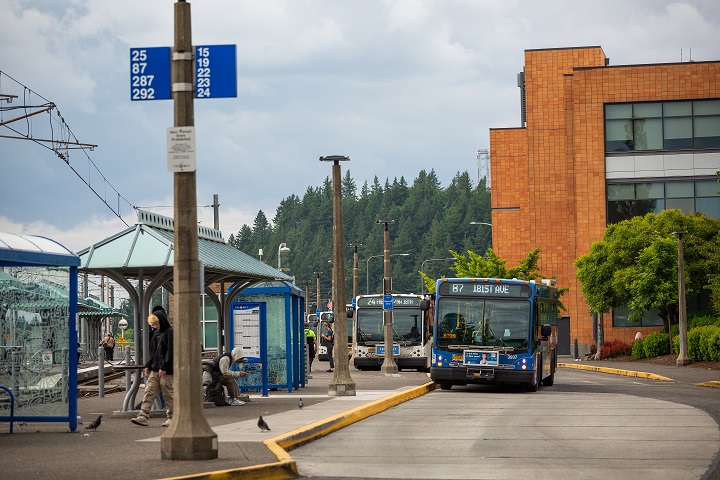TriMet announces services cuts, reductions following failure of transportation bill
Published 12:09 pm Wednesday, July 23, 2025

- After the Oregon Legislature failed to pass House Bill 2025 — the Oregon Transportation Reinvestment Package (TRIP) — TriMet will cut its budget and services this year to address a growing fiscal shortfall. (Submitted by TriMet)
After the Oregon Legislature failed to pass House Bill 2025 — the Oregon Transportation Reinvestment Package (TRIP) — TriMet will cut its budget and services this year to address a growing fiscal shortfall, announced Wednesday.
With a projected $300 million gap between TriMet’s annual expenditures and revenue, it will begin service cuts in November and in March 2026.
In the coming years, these cuts include reduced frequency in bus and MAX routes, cuts to about 140 TriMet operators and spending on contract expenses, while looking at ways to increase revenue, such as increased fares.
Trending
Cuts announced Wednesday, July 23, to close the gap equate to $159 million in service cuts, $93 million in reduced non-service related spending and $48 million in new revenue, according to a TriMet spokesperson.
If new revenue does not add up to $48 million, additional cuts to service and spending will be necessary, but if the new revenue is greater than $48 million, less cuts would need to be made.
“As Oregon’s largest public transit provider, we have a tremendous responsibility to keep people in our region moving. Cutting service now means avoiding sudden, catastrophic cuts in the future,” TriMet General Manager Sam Desue Jr. said in a statement.
Desue Jr. said TriMet is facing a fiscal cliff in 2030, so they must act now to balance the budget for the long term.
Budget reductions
TriMet services will see cuts starting this winter, with a series of cuts over the next few years, resulting in at least a 10% overall cut to services by the end of August 2027.
Service cuts will focus on reducing the frequency of some bus lines and adjusting bus and MAX routes. This will cause the LIFT paratransit service to also be reduced.
Trending
According to a news release, if TriMet fails to increase revenue by 2027, more service cuts will be needed.
Planned service cuts are as follows:
November 2025
TriMet will reduce service on Nov. 30 by cutting the frequency, or how often buses run, on the following:
- Some frequent service lines during evenings and mornings
- FX2 Division bus line at night
- Up to eight other bus lines during all service hours
March 2026
Community members will be invited to discuss these cuts this fall, but proposed cuts would include:
- Eliminating some low ridership bus lines
- Eliminating evening service on lower ridership bus lines
- Changing routes on some bus lines to increase efficiency
- Reducing the MAX Green Line route. Green Line trains would only serve stations between Clackamas Town Center and Gateway Transit Center. Riders would need to transfer to other trains at the Gateway Transit Center.
May 2026 through August 2027
Further service cuts will be required between May 2026 and August 2027 to reach the needed 10% service reduction. Without an increase in revenue, TriMet will have to cut additional service above that 10% to balance its budget.
These service reductions will likely include:
- Additional cuts to frequency on at least a dozen bus lines
- Eliminating other bus lines or portions of lines
- Reducing the frequency on all MAX lines during some parts of the day.
- The anticipated service cuts laid out above add up to about an 18% overall reduction in MAX service — the largest cut to MAX in its history — and about an 8% reduction in bus service — the third largest cut since at least 1986.
Operators, maintenance and support roles will be decreased over the next two years, and a hiring freeze will start, allowing for only mission-critical positions to be filled.
TriMet’s contract expenses will be cut by 5% annually, while mitigating any expense increases in those contracts.
Fare prices won’t change right now, but TriMet is considering a 20-cent increase to its adult fare and a 10-cent increase to its honored citizens and youth fares in late 2028. The company plans to work with lawmakers for an increase in STIF program funding.
Approaching a growing deficit
TriMet’s Board of Directors adopted its current year, fiscal year 2026, budget on May 29, 2025, without assuming an increase in the Statewide Transportation Improvement Fund, which helps fund public transit and had been included in HB 2025.
While developing its budget, TriMet identified $24.2 million in savings by making cuts to discretionary spending, according to a news release.
The company said it plans to balance its budget in three years, making its expenditures equal to, or less than, its revenues.
From 2019 to 2024, TriMet said its operating costs per vehicle have increased 53%, mainly due to inflation, while its fuel and tire costs are up nearly 35% for bus service and facilities maintenance costs are up 71%.
TriMet will launch a dedicated web page at trimet.org/budget in the weeks ahead.







